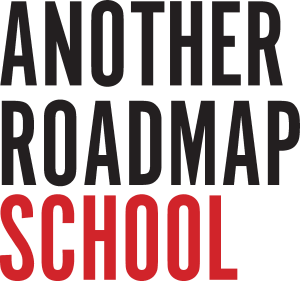Los grupos de trabajo de la Escuela no solo comparten un fuerte compromiso con la acción transformadora en la Educación Artística, sino también una necesidad igualmente intensa de reflexividad respecto a las formas de producción e intercambio de conocimiento en las condiciones globales actuales. Surgieron las siguientes interrogantes:
¿Cómo puede un proyecto de investigación globalmente interconectado trabajar con los diferentes sistemas de conocimiento en los que están inmersos las prácticas de aprendizaje y creatividad en cada contexto geopolítico?
¿Cómo traducimos nuestros términos centrales de trabajo, y cómo abordamos los malentendidos y lo intraducible? Por ejemplo, ¿cómo puede un concepto como «minga» (que se refiere a un modo particular de trabajo colaborativo informal) relevante para los investigadores ecuatorianos entrar en contacto con las economías de cuidado y solidaridad evocadas por los participantes canadienses?
¿De qué manera podemos evitar una estructura que continúe privilegiando las nociones occidentales/europeas de lo que son el «arte» y la «educación», o construir una noción universal de «crítica»? ¿Cuál es una forma de colaborar que permita un intercambio y producción de conocimiento horizontal tanto entre diferentes «conocimientos locales» (como entre iniciativas de educación autogestionadas y estructuras académicas) como entre socios situados en diferentes lugares de una economía global del conocimiento con sus tradiciones coloniales?
La escuela abraza estas cuestiones no como un efecto secundario de la colaboración transregional, sino como contenidos clave del esfuerzo investigativo. Un enfoque reflexivo y responsable de la producción e intercambio de conocimiento es uno de los temas centrales del proyecto.
Estructura horizontal del proyecto
La Escuela Otra Hoja de Ruta (Another Roadmap School) funciona en una estructura de red, en contraposición a una forma piramidal de organización. En la práctica, esto significa que los proyectos y actividades pueden ser propuestos por cualquier miembro o grupo de trabajo, invitando a otros a participar. Las actividades de la Escuela pueden variar desde intercambios virtuales a pequeña escala – como trabajar en un término para el glosario multivocal – hasta colaboraciones de investigación de varios años.
Comité Directivo (CD)
La Escuela está coordinada por un comité directivo internacional. La composición del comité tiene en cuenta la representación de diferentes regiones geopolíticas, así como la representación de los diversos tipos de organización y trabajo en educación artística (museos y galerías, educación formal y academia, trabajo freelance, organizaciones independientes y activistas). Los miembros fueron elegidos en la Reunión Internacional en Madrid en 2015, y la membresía en el CD se revisa en cada reunión internacional. El comité directivo se reúne cada 2 meses en una videoconferencia.
En su composición, el objetivo del CD es incluir miembros de diversas áreas, tipos de entidades y perfiles, así como otros aspectos que aseguren la naturaleza horizontal del grupo. El Comité Directivo no busca representar una sola área o continente, sino más bien repensar las regiones y la diversidad de los miembros de la red.
Las tareas del comité directivo son:
- Los miembros del CD actúan como personas de contacto para Another Roadmap School
- El CD evalúa las propuestas de nuevos grupos de trabajo que deseen unirse a la red de acuerdo con los objetivos y marco de Another Roadmap School y puede aceptar nuevos grupos de trabajo
- los miembros del comité presentan informes sobre los avances en la red (a nivel regional, siguiendo criterios lingüísticos, o concernientes a un proyecto de clúster específico) y mantienen una visión general de las actividades, informando sobre posibilidades de intercambio y acción conjunta
- El CD decide sobre la distribución de los fondos asignados a La Escuela Otra hoja de Ruta (Another Roadmap School) de acuerdo con los respectivos acuerdos con el financiador.
- desarrollan formatos de presentación para el trabajo de la escuela
- desarrollan propuestas para la agenda de las reuniones
- Desarrollan directrices para formatos conjuntos de publicación y distribución, como el glosario multivocal
Los miembros actuales del Comité Directivo son:
- Alejandro Cevallos
- Rubén Gaztambide-Fernandez
- Nora Landkammer
- Carmen Mörsch
- Lineo Segoete
- Emma Wolukau-Wanambwa
- Eileen Legazpi-Ramirez
- Javier Rodrigo
- Mónica Marcell Romero Sánchez
La Escuela Otra hoja de Ruta (Another Roadmap School) prueba así un modo de colaboración que se basa en la responsabilidad y la rendición de cuentas de cada uno y distribuye el poder alejándolo de las instituciones académicas tradicionales y del norte global, hacia la estructura de red. Este modelo parece estar en consonancia con el concepto de una Escuela Abierta y el paradigma de «desaprender el privilegio».
Clústeres y Grupos de trabajo
Otro aspecto de la Escula Otra Hoja de Ruta (Another Roadmap School) es la estructura mediante grupos o clústeres, los cuales son grupos de trabajo enfocados en temas específicos o por regiones y proximidad, o incluso grupos y clústeres transregionales. Estos grupos son validados por el Comité Directivo, que supervisa su labor, pero pueden operar con relativa autonomía, siempre dentro del marco general de la red.
Asamblea Regular
Lastly, efforts will be made to hold a general assembly once a year, bringing together the committee and other network members. To get involved with the network, please refer to the ‘Participate’ section for details on how to become a member.
